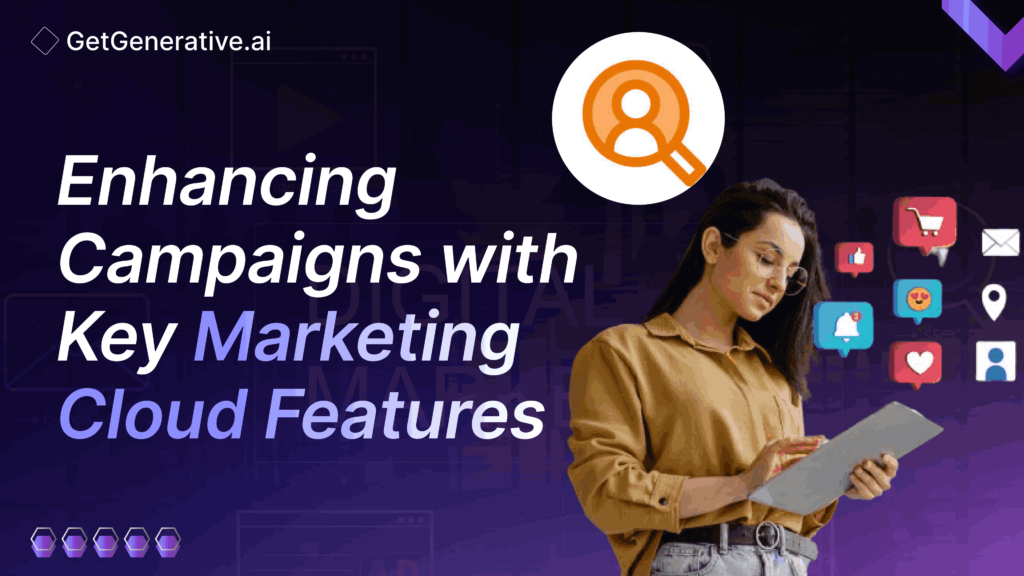Enhancing Campaigns With Key Salesforce Marketing Cloud Features
A study by Forrester Consulting found that organizations using Salesforce Marketing Cloud achieved a 299% ROI over three years. The platform helped increase incremental revenue by over $5 million, raise site conversion rates by 60% in the third year, and increase average order value by 35%
With these impressive numbers in mind, let’s explore the world of Salesforce Marketing Cloud and its powerful features, which are helping businesses achieve their marketing goals.
What is Salesforce Marketing Cloud?
Salesforce Marketing Cloud is a comprehensive digital marketing platform that enables businesses to create, manage, and optimize customer journeys across various channels. It provides tools designed to help marketers deliver personalized, data-driven experiences at scale, fostering stronger customer relationships and driving business growth.
Key Marketing Cloud Features
Cross-Channel Marketing Management
One of Salesforce Marketing Cloud’s standout features is its ability to manage marketing efforts across multiple channels seamlessly. This feature allows businesses to create cohesive marketing campaigns spanning email, social media, mobile, web, and offline channels.
With Cross-Channel Marketing Management, marketers can:
- Develop consistent messaging across all touchpoints
- Coordinate campaign timing and sequencing across channels
- Track customer interactions across channels for a unified view of the customer journey
- Optimize channel mix based on customer preferences and engagement data
This integrated approach ensures that customers receive a consistent brand experience regardless of how they interact with your business, leading to improved engagement and conversion rates.
Email Communication Automation
Email remains one of the most effective marketing channels, and Salesforce Marketing Cloud offers robust email automation capabilities. This feature allows businesses to create, send, and track email campaigns easily.
Key aspects of Email Communication Automation include:
- Drag-and-drop email builders for creating visually appealing messages
- Advanced segmentation tools for targeting specific audience groups
- A/B testing capabilities to optimize email performance
- Triggered emails based on customer behavior or predefined rules
- Real-time tracking and reporting of email campaign performance
By automating email communications, businesses can save time, improve relevance, and increase the overall effectiveness of their email marketing efforts.
Customer Journey Creation
The Customer Journey Creation feature in Salesforce Marketing Cloud allows marketers to design and automate complex, multi-step customer journeys. This powerful tool enables businesses to map the entire customer lifecycle, from initial awareness to post-purchase engagement.
With Customer Journey Creation, you can:
- Visually map out customer journeys using an intuitive drag-and-drop interface
- Set up triggers and decision points based on customer actions or data
- Automate content delivery across multiple channels within the journey
- Personalize each step of the journey based on customer data and behavior
- Monitor and optimize journey performance in real-time
By creating tailored customer journeys, businesses can more effectively guide prospects and customers through the sales funnel, increasing conversion rates and customer lifetime value.
Data and Audience Management
Effective marketing relies on accurate, up-to-date customer data. Salesforce Marketing Cloud’s Data and Audience Management features provide robust tools for collecting, organizing, and leveraging customer data to drive marketing success.
Key capabilities include:
- Data integration from multiple sources (CRM, web, mobile, etc.)
- Advanced segmentation and audience-building tools
- Real-time data updates and synchronization
- Data cleansing and normalization
- Privacy and compliance management tools
With these features, businesses can create a unified view of each customer, enabling more targeted and effective marketing efforts.
Personalization and AI Integration
Personalization is crucial in modern marketing, and Salesforce Marketing Cloud leverages artificial intelligence to take personalization to the next level. The platform’s AI capabilities, powered by Salesforce Einstein, enable marketers to deliver hyper-personalized experiences at scale.
AI-powered personalization features include:
- Predictive content selection for emails and web pages
- Automated send-time optimization
- Product recommendations based on browsing and purchase history
- Predictive scoring for leads and opportunities
- Natural language processing for social media sentiment analysis
By harnessing the power of AI, businesses can create more relevant, engaging experiences for their customers, leading to improved conversion rates and customer satisfaction.
Also Read – Salesforce Marketing Cloud Consultant: A Complete Guide
Social Media and Mobile Engagement
In today’s mobile-first world, engaging customers on social media and mobile devices is crucial. Salesforce Marketing Cloud offers comprehensive tools for social media marketing and mobile engagement.
Social media features include:
- Social listening and sentiment analysis
- Social media content creation and scheduling
- Social advertising campaign management
- Social customer service integration
Mobile engagement capabilities include:
- SMS and MMS messaging
- Mobile app push notifications
- Location-based marketing
- Mobile-optimized email and landing page creation
These features enable businesses to reach customers where they spend much of their time – on social media and mobile devices – with timely, relevant messages.
Analytics and Performance Insights
Businesses need access to comprehensive analytics and performance insights to optimize marketing efforts. Salesforce Marketing Cloud provides powerful reporting and analytics tools that help marketers understand the impact of their campaigns and make data-driven decisions.
Key analytics features include:
- Real-time dashboards and reports
- Multi-touch attribution modeling
- Predictive analytics for campaign performance
- A/B testing and optimization tools
- Custom report creation and scheduling
With these insights, marketers can continually refine their strategies, improve ROI, and demonstrate the value of their marketing efforts to stakeholders.
Integration Capabilities
Salesforce Marketing Cloud’s integration capabilities allow it to connect seamlessly with other systems and data sources, creating a unified marketing ecosystem. This feature is crucial for businesses leveraging their existing technology investments and creating a cohesive marketing technology stack.
Integration capabilities include:
- Native integration with other Salesforce products (Sales Cloud, Service Cloud, etc.)
- APIs for custom integrations with third-party systems
- Pre-built connectors for popular marketing tools and platforms
- Data synchronization across integrated systems
- Single sign-on (SSO) capabilities for streamlined user access
These integration capabilities ensure that Salesforce Marketing Cloud can work harmoniously with a business’s existing technology landscape, maximizing efficiency and data utilization.
How does Salesforce Marketing Cloud integrate with other Salesforce products?
Salesforce Marketing Cloud integrates seamlessly with other products, creating a unified customer experience platform. This integration allows for smooth data flow and consistent customer interactions across sales, service, and marketing functions.
Key integration points include:
- Shared customer data between Marketing Cloud and Sales/Service Clouds
- Ability to trigger marketing journeys based on sales or service interactions
- Unified reporting and analytics across all Salesforce products
- Consistent user interface and single sign-on across the Salesforce ecosystem
This tight integration enables businesses to create truly customer-centric experiences that span the entire customer lifecycle.
What are the main benefits of using Salesforce Marketing Cloud for small businesses?
While Salesforce Marketing Cloud is often associated with large enterprises, it offers significant benefits for small businesses as well:
- Scalability: The platform can grow with your business, starting with essential features and expanding as needed.
- All-in-one solution: Small businesses can consolidate their marketing tools into a single platform, reducing complexity and costs.
- Advanced capabilities: Access to enterprise-grade marketing features that might otherwise be out of reach for small businesses.
- Improved efficiency: Automation features allow small marketing teams to accomplish more with limited resources.
- Data-driven decision making: Robust analytics help small businesses optimize their marketing spend and strategies.
Also Read – Salesforce Marketing Cloud Implementation Guide
How does Salesforce Marketing Cloud’s AI-powered Multi-Touch Attribution work?
Salesforce Marketing Cloud’s AI-powered Multi-Touch Attribution uses machine learning algorithms to analyze the impact of various marketing touchpoints on conversions. This feature helps marketers understand which channels and campaigns are most effective in driving desired outcomes.
The process works as follows:
- Data collection: The system gathers data on all customer interactions across channels.
- Pattern recognition: AI algorithms identify patterns in the data, linking touchpoints to conversions.
- Attribution modeling: The system applies various attribution models (e.g., first-touch, last-touch, linear, time decay) to distribute credit for conversions.
- Insights generation: The AI provides insights on the most effective channels and campaigns, helping marketers optimize their strategies.
This AI-powered approach provides a more accurate and nuanced understanding of marketing performance than traditional attribution methods.
Can you explain the differences between Marketing Cloud Engagement and Account Engagement?
Marketing Cloud Engagement and Marketing Cloud Account Engagement (formerly Pardot) are two distinct products within the Salesforce Marketing Cloud ecosystem, each designed for different marketing scenarios:
Marketing Cloud Engagement:
- Focused on B2C marketing
- Designed for high-volume, multi-channel consumer marketing
- Includes features for email, mobile, social, and advertising
- Ideal for businesses with large consumer databases
Marketing Cloud Account Engagement:
- Focused on B2B marketing
- Designed for account-based marketing and lead nurturing
- Includes features for lead scoring, lead nurturing, and sales alignment
- Ideal for businesses with longer, more complex B2B sales cycles
While both products share similar features, they are optimized for different marketing approaches and business models.
Conclusion
Salesforce Marketing Cloud offers a powerful suite of features designed to help businesses of all sizes succeed in the complex world of digital marketing. From cross-channel campaign management to AI-powered personalization and analytics, the platform provides the tools to create engaging, effective marketing campaigns that drive business growth.
Enhance your Salesforce consulting with GetGenerative.ai. Effortlessly craft outstanding proposals, enabling you to dedicate more time to providing exceptional client service.
Start today!
FAQs
1. What is Salesforce Marketing Cloud?
A comprehensive digital marketing platform for creating, managing, and optimizing customer journeys across various channels.
2. Can small businesses use Salesforce Marketing Cloud?
Yes, it offers scalable solutions suitable for businesses of all sizes.
3. Does Salesforce Marketing Cloud support email marketing?
Yes, it provides robust email automation and personalization features.
4. Can I integrate Salesforce Marketing Cloud with other systems?
Yes, it offers extensive integration capabilities with both Salesforce and third-party systems.
5. Does Salesforce Marketing Cloud use AI?
Yes, it incorporates AI-powered features for personalization, analytics, and optimization.




